Giving with Impact: Tips for Sustainable Corporate Gifts and Swag
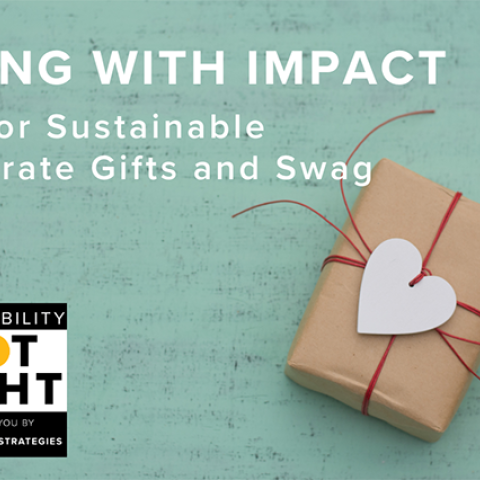
Exclusively sponsored by Honeycomb Strategies
As we approach the end of the year, many of us are planning corporate holiday gifts and budgeting for next year’s event swag and merchandise purchases. So now is a good time to consider what we’re purchasing and make thoughtful decisions or substitutions based on attention to manufacturing impact, shipping, disposal, and humane conditions in the supply chain.
We consider experiential gifts (a massage, a performance, a party, a discount or perk) to be the gold standard for gifting, both for the impression they make on the receiver and for their environmental impact. Be creative and give an experience when you can. If you decide to buy a physical object, here are some things to consider:
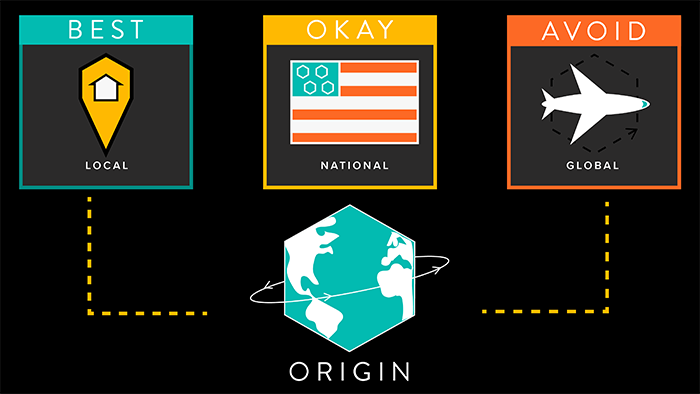
Where was it made?
Point of origin matters for a lot of reasons! Locally sourced items have a lower carbon footprint from transportation and will benefit the economy in your area. Plus, your gifts will have the flavor of local culture, which will be more unique (and eye-catching!) and more meaningful (and memorable!) to your recipients. We recommend seeking out artisans, trades- and craftspeople in your area, and small businesses run by veterans, women-owned, LGBTQIA+ or BIPOC folks to make an impact with your purchasing as well as the giving.
If you’re based in the U.S. or other countries with scrupulous labor laws, a point of origin from within your country also ensures that fair labor standards and humane conditions are used to create your items.
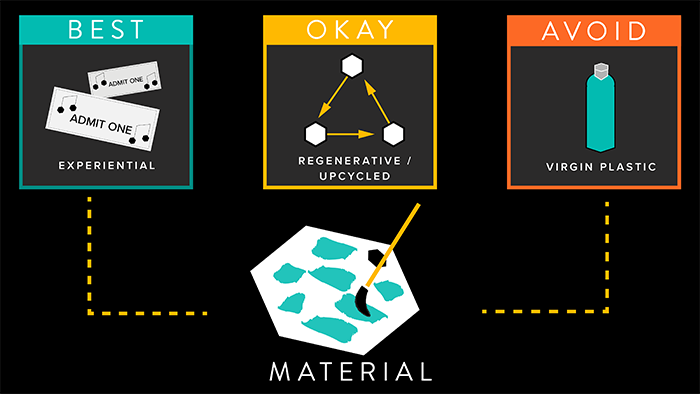
What is it made from?
Some popular gift items are made from some of the most harmful materials out there. Knowing this ahead of time may help you pivot to another item that’s just as great without the negative impact.
Avoid items made of virgin plastic. Even recycled plastic is better than virgin material. Looking at the Life Cycle Assessment of any plastic product reveals harmful, extractive measures of manufacturing that frequently rely on dangerous labor, and nearly-impossible conditions for environmentally sound disposal. Just…avoid it. Instead, go for metal or bamboo, or other easily regenerative and recyclable materials. Look for upcycled and recycled materials too.
Apparel is a very difficult item to dispose of, so be very mindful when gifting these items and make sure your recipients will treasure them instead of tossing them in the landfill. There’s a growing movement of upcycled apparel that uses repurposed materials and offers one-of-a-kind items as a result. Seek out these unique and sustainable options, and also keep an eye out for organic, regenerative, and ethically sourced fibers.
Electronics are highly desirable and high-value gifts. Remember that electronics age quickly as technology evolves, and trendy items this year may be obsolete next year. Purchase items that can be recycled for their parts with relative ease and be mindful of utility and projected longevity of the items you’re selecting.
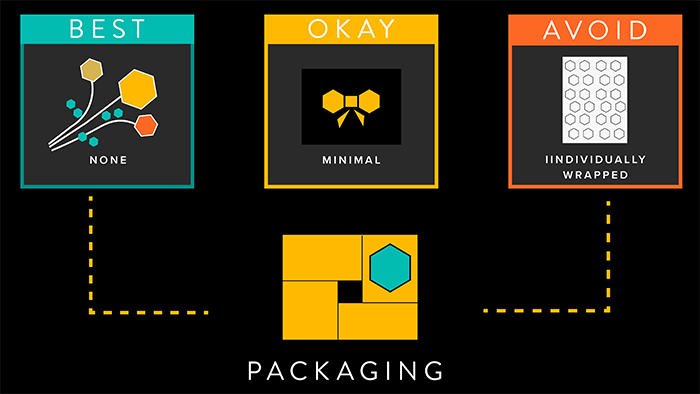
How is it packaged?
The rule of thumb is “less is more.” Ideally, items you purchase don’t need any extra packaging at all by buying locally to avoid shipping, or by opting for a digital item or an experiential gift. But for anything fragile, you can ask your supplier to minimize packaging and eliminate certain harmful materials like polystyrene (packing peanuts and Styrofoam) or poly bags (hard to recycle plastic liners that have little protective use). Opt out of individually wrapped items and look for packing materials that are recycled and recyclable, water-soluble, and/or compostable.
There’s a burgeoning industry around sustainable packaging that makes these solutions achievable for many manufacturers and makers. By asking for high standards around packaging, businesses receive important feedback about what their customers want, and hopefully will make the shift to more sustainable materials.
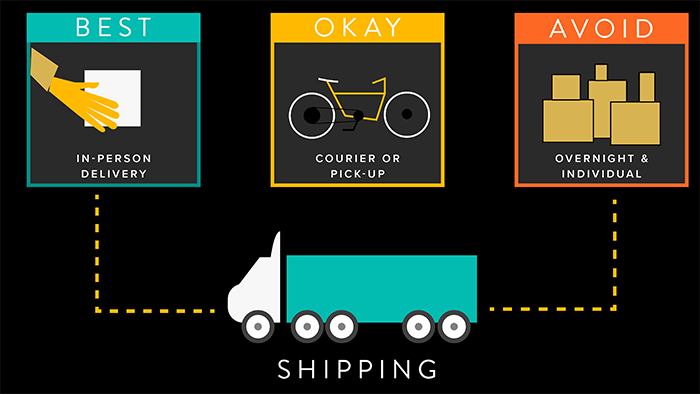
How is it shipped?
As we mentioned earlier, buying locally saves money and carbon in shipping costs. When purchasing from anywhere outside of your local area, however, be conscious that overnight shipping can be especially wasteful. For any shipping, consolidate quantities, use no-rush shipping, make sure your packaging is up to eco-snuff, and offset the carbon impact (how-tos from UPS and FedEx) for the best environmental outcomes.
When sending items on to their final recipients, it’s best to hand-deliver items for the most meaningful exchange. You can use bike couriers instead of truck messengers to deliver locally or designate a pick-up spot at a gathering place.
Keep on Giving
Gifts can be powerful ways to generate leads, maintain industry connections, and thank your clients and partners. The effect of your generosity will be augmented with thoughtfully curated items that uphold your sustainable values. If you’re gifting in a new way this year because of a sustainable pivot, don’t be shy about telling that story in your end-of-year messaging; your partners will value hearing how you’ve taken the time to think it through. Remember that even making small changes in your swag and gift ordering can make a big difference – both to the environment and your network connections, increasing your reach and impact.
For a downloadable version of this gift guide, go here:
Honeycomb Strategies specializes in impactful solutions for sustainable events, sports, and venues. hcsustainability.com/hello@hcsustainability.com
Don’t miss any event-related news: Sign up for our weekly e-newsletter HERE, listen to our latest podcast HERE and engage with us on LinkedIn!


Add new comment